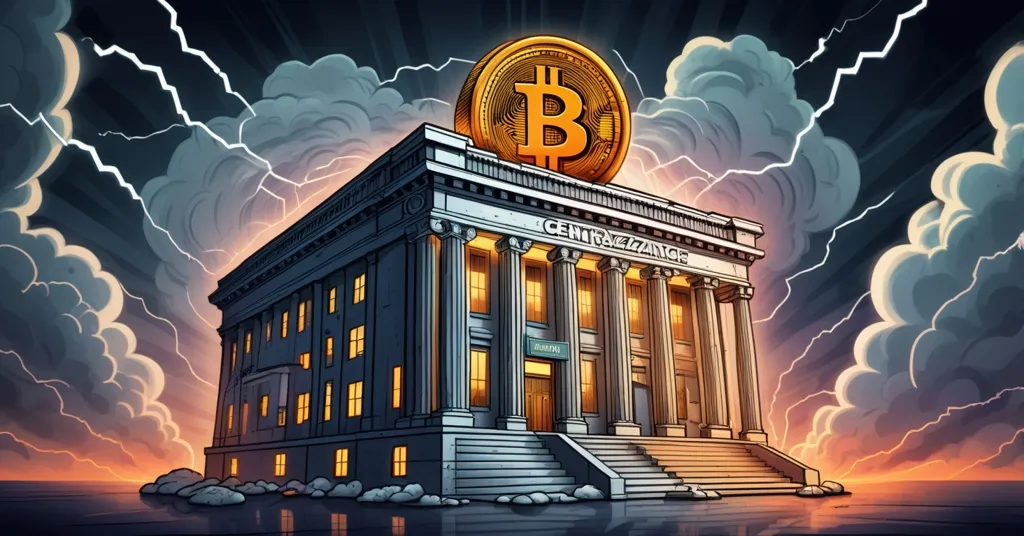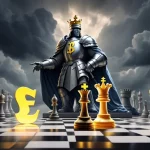ECB Succession Race Heats Up: Klaas Knot Emerges as Bitcoin’s Centralized Rival

Lagarde Keeps ECB Succession Wide Open: Klaas Knot in the Spotlight
Who will steer Europe’s financial ship after 2027—and could their missteps drive more people to Bitcoin as a lifeboat? Christine Lagarde, the current European Central Bank (ECB) President, recently stirred the pot by endorsing Klaas Knot, former head of the Dutch central bank, as a top contender to replace her when her term ends. But she’s adamant the race isn’t over, leaving room for speculation as economic storm clouds gather over the eurozone.
- Knot’s Credentials: Lagarde lauds Klaas Knot’s intellect and leadership, though he’s not the only candidate for ECB President in 2027.
- Economic Pressures: Eurozone inflation climbs to 2.2%, with trade tensions adding uncertainty.
- Crypto Relevance: Centralized policy struggles highlight Bitcoin’s appeal as a decentralized alternative.
Klaas Knot: A Front-Runner with Grit
Christine Lagarde isn’t one to hand out praise lightly, but when it comes to Klaas Knot, she’s not holding back. Having worked alongside him for over six years, she’s seen his mettle firsthand. “I’ve known him for at least six years. He has the intellect, the stamina, and the ability to engage others,” she said in a recent podcast interview. The ECB’s Governing Council, a notoriously tough crowd of divergent opinions, needs a leader who can wrangle strong personalities without breaking a sweat. Lagarde believes Knot fits the bill, noting, “They’re often all prima donnas, and you have to facilitate them all. He has that ability. But he’s not the only one.” Her caveat keeps the succession race intriguing—her non-renewable term ends in October 2027, and while Knot is a standout, the door remains ajar for other heavyweights to step in. For more on her stance, see the discussion on Lagarde’s thoughts about Knot and other potential candidates.
Knot’s track record speaks for itself. He led De Nederlandsche Bank (DNB), the Netherlands’ central bank, for an impressive 14 years from 2011 until June 2025, when he passed the baton to Olaf Sleijpen, nominated by Dutch Finance Minister Eelco Heinen. His long tenure wasn’t just a national affair—it paved the way for a global role as chairman of the Financial Stability Board (FSB) since December 2021. The FSB, for those unfamiliar, is a crucial international body that monitors risks to the global financial system, working to prevent repeats of catastrophes like the 2008 crisis. Its efforts help safeguard everyday savings and jobs from systemic meltdowns, a mission Knot takes seriously. He credits his extended time at DNB for landing this position, pushing back against proposals to cut Dutch central bank terms from seven to five years. “With two five-year terms, I would not have reached that position [as FSB chairman],” he argued, emphasizing that sustained authority is vital for smaller nations like the Netherlands to punch above their weight. He doubled down, saying, “Only with a strong position in international supervisory bodies can the Netherlands respond timely to developments impacting its financial system.”
Knot isn’t just a polished diplomat—he’s got a sharp edge. Peeking behind closed doors, he revealed, “If you were a fly on the wall during our board meetings, you would see plenty of pushback.” That willingness to challenge and debate could be just what the ECB needs in a leader, especially as economic challenges mount.
Eurozone’s Economic Quagmire: Inflation and Trade Threats
While Knot’s resume shines, the mess he or any successor might inherit at the ECB is daunting. Inflation in the eurozone ticked up to 2.2% in September, edging past August’s 2.0% and marking the highest level since April. Think of inflation as a slow leak in your wallet—each month, groceries, rent, and gas nibble away a bit more of your purchasing power. The ECB targets a steady 2% inflation rate as a sweet spot for economic health, so this uptick, coupled with a modest 0.1% monthly rise in consumer prices, signals persistent pressure. Historically, the ECB has wrestled with inflation spikes—like during the post-COVID supply chain chaos—often responding with rate hikes to cool demand. Now, they’re playing a different game. Over the past year, the ECB slashed its deposit rate (the interest it pays banks for holding money) from a higher level down to 2%, aiming to encourage borrowing and spending to boost a sluggish economy. Lagarde remains pragmatic, stating, “The risks to inflation appear quite contained in both directions. With policy rates now at 2%, we are well placed to respond if the risks to inflation shift, or if new shocks emerge that threaten our target.”
But inflation isn’t the only wolf at the door. Trade tensions with the United States loom large, threatening to disrupt stability. Klaas Knot didn’t mince words when criticizing tariff policies pushed by former US President Donald Trump, calling them economic vandalism in all but name. “It has nothing to do with economic theory. And if it were not so serious, it would be laughable,” he snapped. Tariffs—taxes on imported goods—might be a political flex, but for the eurozone, they’re a potential wrecking ball. Higher costs for imports can fuel inflation further, squeeze businesses, and slow growth, complicating the ECB’s already delicate balancing act. With real-world impacts like pricier consumer goods or job risks in export-driven industries, these external shocks test the limits of centralized policy control.
ECB Leadership: What’s Really at Stake?
The question of who takes over after Lagarde isn’t just a personnel shuffle—it’s about the future of monetary policy for 20 eurozone countries. Knot’s history at DNB suggests a tendency to prioritize inflation control over flooding the economy with cash, a contrast to predecessors like Mario Draghi, whose “whatever it takes” mantra during the 2012 debt crisis became legendary for aggressive intervention. Yet Knot’s global experience at the FSB might temper that instinct with a more collaborative, big-picture approach. Still, with Lagarde hinting at multiple candidates, who else might emerge? Could a political figure with less banking pedigree but strong EU ties snag the role, prioritizing unity over technical expertise? Or will another seasoned central banker, perhaps from a larger economy like Germany or France, challenge Knot’s frontrunner status? The ECB needs someone who can navigate not just numbers, but the messy politics of a fractured union.
Beyond the individual, the stakes are monumental. The next leader will face inflation ghosts, potential trade wars, and the specter of a digital euro—a centralized digital currency the ECB is exploring—that could either modernize fiat or further entrench control. Every decision ripples through global markets, affecting everything from mortgage rates in Amsterdam to factory output in Milan. For a body often criticized as a clunky dinosaur, the ECB’s influence remains undeniable, even if its methods clash with the nimble, disruptive ethos of newer financial systems.
Bitcoin’s Shadow: A Decentralized Counterpoint
Let’s cut to the chase: centralized financial systems like the ECB are legacy giants ripe for disruption, and their struggles only spotlight Bitcoin’s allure. When fiat currencies buckle under inflation—eroding savings as prices climb—Bitcoin stands as a potential hedge with its fixed supply of 21 million coins, immune to money-printing sprees. Historical cases like Venezuela, where hyperinflation drove citizens to crypto for survival, or Argentina, where peso devaluation fuels Bitcoin adoption, underscore this trend. Trade disputes and tariff nonsense? Bitcoin doesn’t care about borders or political whims—its peer-to-peer network laughs in the face of centralized overreach. As fiat currency inflation drives interest in decentralized finance alternatives, the ECB’s every fumble fuels the argument for financial sovereignty through blockchain tech.
But let’s play devil’s advocate for a moment. Bitcoin isn’t a silver bullet. Its price volatility—wild swings that can wipe out gains overnight—makes it a risky bet compared to the ECB’s clunky but predictable stability. Regulatory hurdles also loom; governments aren’t likely to let decentralized money run wild without a fight. And while the ECB’s policies often frustrate, their ability to prop up economies during crises (think 2008 or COVID) can’t be ignored. A digital euro, if executed well, might even offer some of blockchain’s benefits—faster transactions, lower costs—under centralized guardrails, potentially rivaling crypto’s appeal. Still, for Bitcoin maximalists and decentralization purists, every misstep by central banks is another brick in the wall of distrust, pushing the case for a parallel financial universe.
Key Takeaways and Questions
- Who is Klaas Knot, and why is he a top contender for ECB President?
Klaas Knot, former head of De Nederlandsche Bank for 14 years and current Financial Stability Board chairman, is praised by Christine Lagarde for his intellect and ability to manage tough crowds, making him a strong candidate to succeed her in 2027. - What economic challenges does the eurozone face under ECB oversight?
Inflation has risen to 2.2% in September, above the 2% target, while trade tensions with the US, including criticized tariff policies, risk further economic strain. The ECB has cut its deposit rate to 2% to support growth. - Why does Knot argue against shorter central bank terms?
He believes longer terms, like his 14-year stint at DNB, are crucial for building authority in global roles such as FSB chairman, enabling smaller nations like the Netherlands to influence international finance. - How do trade tensions impact the eurozone’s financial stability?
US tariff policies, slammed by Knot as lacking economic logic, could raise import costs, fuel inflation, and disrupt growth, complicating the ECB’s efforts to stabilize the region. - Can Bitcoin solve centralized economic problems like inflation?
Bitcoin offers an alternative with its fixed supply and borderless nature, gaining traction during fiat crises, though its volatility and regulatory risks temper its readiness as a full replacement for centralized systems.
As the ECB succession drama unfolds, the stakes couldn’t be higher. Whether it’s Knot or another player, the next leader will grapple with a fractured economic landscape where every move echoes far beyond Europe. For the crypto crowd, it’s a glaring reminder of why building independent financial systems matters. If central banks keep stumbling over inflation and trade spats, will Bitcoin become the go-to for a disillusioned generation, or are we banking too much on a tech still finding its footing? That’s the million-BTC question.



